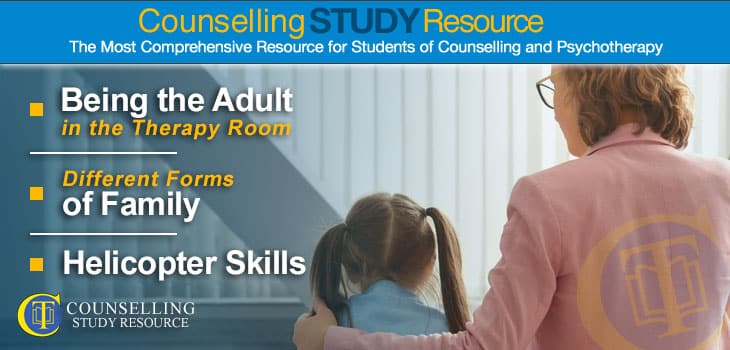118 – Being the Adult in the Therapy Room
Different Forms of Family – Helicopter Skills in Counselling
In episode 118 of the Counselling Tutor Podcast, Ken Kelly and Rory Lees-Oakes describe the importance of the counsellor ensuring that they are being the adult in the therapy room. In ‘Practice Matters’, Rory talks about different types of family structures, and considerations in working with clients in this respect. Last but not least, the presenters look at helicopter skills in the therapy room.
Being the Adult in the Therapy Room (starts at 1.28 mins)
Social worker and psychotherapist Keith Tudor said: ‘The adult is parent to the child.’ This is also the title of a book he has written.
As a counsellor, you are likely at some point to have a client who acts out in the therapy room, seeking to test or push boundaries.
Paediatrician and psychoanalyst Donald Winnicott believed that when this happens, the client is re-enacting their early childhood experiences. It may be important for them to do this, and it is vital that the therapist is able to remain in the adult state while this occurs.
A client may well look to their counsellor as someone who’s OK in the world. Ensuring that you are in the adult ego state in the therapy room is important, supporting the client to stabilise and fully enter the here-and-now.
It is therefore really important for you to have good self-awareness, using self-monitoring and supervision to explore any possible transference and countertransference.
Warning signs that the latter may be occurring include feelings of irritation towards the client, or feeling judgmental.
Different Forms of Family (starts at 8.45 mins)
While the traditional ‘nuclear family’ (a term originally coined in 1947) consisted of a mother, father and two children, the reality today is that families come in many different forms.
Rory presents information from the Office for National Statistics on family structures today, and explores what you might need to think about when working with clients from different family types.
Above all, it’s important not to make assumptions when a client refers to ‘family’: it’s much better to ask them to expand on what ‘family’ looks likes to them, to ensure that you are viewing this from their – not your – frame of reference.
Rory’s handout on this topic can be downloaded here; it is also available through the Handouts Vault and Counselling Study Resource (CSR).
Helicopter Skills (starts at 15.28 mins)
This topic was raised in our Counselling Tutor Facebook group, where you can find over 24,000 students, qualified practitioners, supervisors and tutors interested in the world of counselling and psychotherapy.
One member of our community there asked how we can assess the client where we are in the therapeutic relationship while also remaining in their frame of reference.
The answer is that this is indeed an advanced skill, but one that we can and do acquire through practice and experience.
It’s rather like learning to dive – at first it seems overwhelming to have to think about all the car’s controls and displays while also watching the road ahead and the environment around us, but in time this all becomes second nature.
In other words, it’s becomes part of our unconscious competence.
The term ‘helicopter’ skills refers to the ability to allow part of yourself to ‘hover above’ the exchange with the client and to observe what is going on in you and in the therapeutic relationship.
An experienced therapist can do this while another part of them stays in the client’s frame of reference.
Rory compares this to someone working on a computer with two monitors, one showing the detail of the task in hand and the other showing the whole picture. Doing both with equal attention is sometimes referred to as ‘esoteric’ thinking.
Free Handout Download
Different Types of Family Structures
